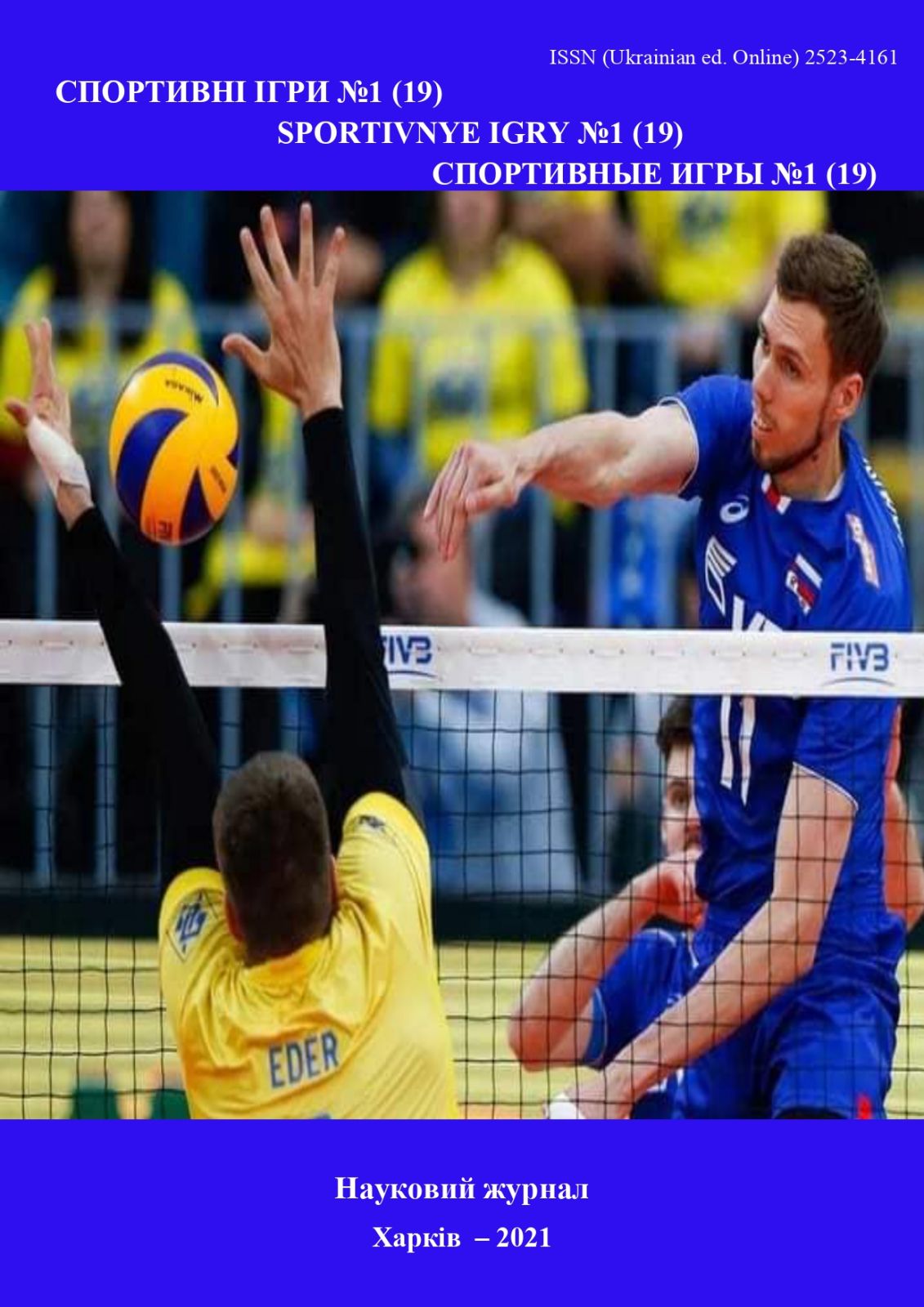The influence of the play method on the quality of swimming readiness of primary school children involved in recreational swimming
DOI:
https://doi.org/10.15391/si.2021-1.9Keywords:
swimming lessons, children, outdoor games, swimming readinessAbstract
The aim of the study was
to study the influence of the use of outdoor games on the quality of swimming readiness of primary
school children involved in recreational swimming. Materials and methods: data collection was
carried out in the groups of primary swimming training in the pool "Pioneer" (KO MSDYUSSHOR
in water sports of Yana Klochkova) and lasted three months. The research involved 40 children 7-
10 years old who regularly attend recreational swimming classes. The subjects were divided into
two groups of 20 swimmers with the same level of fitness. The first group - experimental (EG), the
second – control (CG). All means that were used during the lessons in the EG were divided into two
groups: 1) outdoor games and game tasks in the water for studying and improving the swimming
technique (50-55%); 2) exercises that are usually used to study and improve swimming techniques
(up to 45%). In the CG, mainly traditional exercises, provided by the program, were used. Game
tasks accounted for approximately 20% of all means that were used during the lessons of this
group. The research was carried out in two stages. The level of swimming readiness was
determined before and after the end of the experiment; a comparative analysis of the data obtained
was carried out. Applied: analysis and generalization of scientific - methodical literature;
pedagogical observation; pedagogical experiment; test method (control tests) method of
mathematical processing of research data. Results: the study showed that the swimmers from the
EG significantly improved the test results due to the use of a complex of outdoor games and game
tasks with elements of sports swimming during educational and training sessions. In the CG there
was also an improvement in indicators, however, it was not so noticeable in comparison with the
EG. Conclusions: the expediency of using outdoor games and game tasks during classes aimed at
increasing the level of swimming readiness of primary school children was established. The
proposed methodology made it possible to significantly increase the level of indicators of children's
swimming readiness. In the EG there was a significant improvement of the results in all indicators
of technical and swimming fitness of athletes (p <0.05). Positive dynamics took place in the CG as
well, but the positive changes were not so significant in comparison with the EG, although they are
significant (p <0.05).
References
Булгакова, Н.Ж. (2011). Игры у воды, на воде. М. : Физкультура и спорт.77.
Васильев, В.С. (2010). Обучение детей плаванию. М. : Физкультура и спорт. 96.
Ганчар, И.Л. (1998). Плавание. Теория и методика преподавания. Минск : Четыре четверти; Экоперспектива.
Кочергов, В.Н. (1998). Программно-нормативное содержание учебного процесса для учащихся 1-3 классов на основе учебного процесса по плаванию на основе технологии дифференцированного обучения. Состояние и перспектива совершенствования физической культуры и системы образования. Омск. : Просвещение.
Кубышкин, И.В. (1998). Учите школьников плавать. М. : Просвещение.
Лях, В.И. (1998). Тесты в физическом воспитании школьников. М. : Физкультура и спорт.
Макаренко, Л.П. (2009). Подготовка юных пловцов. М. : Физкультура и спорт.
Никитский, Б.Н. (2009). Плавание. М. : Просвещение.
Осокина, Т.И. (2011). Как научить детей плавать. М. : Физкультура и спорт.
Погребной, А.И. (1999). О некоторых принципах обучения плаванию. Теория и практика физической культуры и спорта, 3, 59-63.
Программа обучения плаванню. Retrieved from https:// zddou25.edumsko.ru.
Плавание: примерная программа спортивной подготовки для детско-юношеских спортивных школ, специализированных детско-юношеских школ олимпийского резерва (2004). М. : Советский спорт.
Шейко, Л.В. (2016). Использование игрового метода для формирования волевой активности у младших школьников при обучении плаванию. Спортивные игры, 1, 75-79.
Шейко, Л.В. (2017). Применение подвижных игр для предупреждения возникновения чувства страха у детей младшего школьного возраста на этапе освоения с водой. Спортивные игры, 1, 84-88.
Шейко, Л.В. (2018). Эффективность применения подвижных игр в воде на этапах начального обучения плаванию детей младшего школьного возраста. Слобожанський науковоспортивний вісник, 2(64), 88-93. doi.org/10.15391/snsv.2018-2.017













